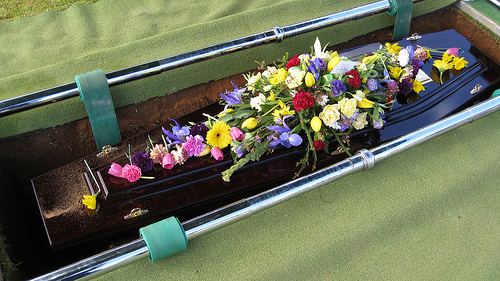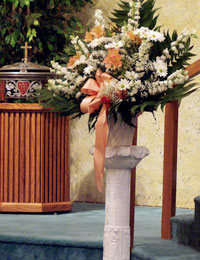Death and Burial Rituals
Burial Rituals
Death and Burial Rituals
The Business of Death
Around the world, every day, every hour, every second, medical treatment is unable to prevent death. When doctors, nurses and hospitals can do no more for a patient, another industry steps in.
World population Estimate – 7,142,797,806
There are bodies everywhere.
World Death Rate: 8 deaths/1,000 population 55.3 million people die each year 151,600 people die each day 6316 people die each hour 105 people die each minute ~2 people die each second
Burial Rituals:
Traditional Western Customs:
The two most common methods for the disposal of corpses are:
• Cremations (Burning the body) or
• Interment (Burying the body)
Today, the average North American traditional funeral costs between $7,000 and $10,000.
• Fee for the funeral director’s services: $1,500
• Cost for caskets: $2,300
• Embalming: $500
• Cost for using the funeral home for the actual funeral service: $500
• Cost of a grave site: $1,000
• Cost to dig the grave: $600
• Cost of a grave liners or outer burial vaults: $1,000
• Cost of monuments: $1,500
Islamic Customs:
• Muslims try to bury their dead ASAP.
• Family or community members wash and shroud the body in scented water and clean white cloth.
• The body is positioned so that the head is facing Mecca. The average adult Islamic funeral, before the cost of burial, was $6,550 in 2009, according to the National Funeral Directors Association.
Tibetan Buddhist Sky Burial:
• The traditional Tibetan Sky Burial involves a corpse being dismembered by trained professionals and left outside (in one of the 1075 sky burial sites) for animals to feast upon. Today, 80% of Tibetans choose to have Sky Burials.
Green Burials in the U.S.:
• Going “Green?” People are forgoing traditional methods for environmentally friendly burials.
• Why expose the Earth to unnecessary embalming chemicals or steel caskets.
• Opts for biodegradable caskets or having your remains turned into an artificial reef? Factoid: Americans currently bury around one million tons of steel caskets each year.
Ngaben:
• Balinese cremation ceremony is performed to send the dead onto their next life, and is considered a sacred duty.
• The dead are placed inside a coffin, which is then placed inside a structure resembling a buffalo or temple.
• The structure is carried to the cremation site and set aflame. In group ceremonies upwards of 60 people’s remains were cremated at one time.
Ghana’s Elaborate Custom Coffins:
• In Ghana it is popular to bury loved ones in coffins that represent certain aspects of them, generally either an occupation, or something they loved.
• For example, a farmer might be buried in a coffin that was built to resemble an ear of corn, or a businessman could be buried in a coffin resembling a plane.
Famadihana – The Turning of the Bones:
• The Malagasy people of Madagascar have a famous ritual in which every five to seven years, the family has a celebration at its ancestral crypt.
• The cloth-wrapped bodies of the deceased are exhumed and sprayed with wine or perfume, before being brought out for family members to dance with while a live band plays.
Space Burial:
• Money can buy you anything, even a burial in space.
• The first of these burials took place in 1997 and contained ashes of 22 people (including Timothy Leary and Gene Roddenberry).
• Cost, depending on how far you want your ashes to go, $1,000 – $12,000.
No Longer Practiced
Sokushinbutsu:
• Originating over 1000 years ago, Sokushinbutsu was practiced by a sect of Buddhist monks, and resulted in self-mummification.
• Process that involved eating nuts, bark, and drinking poisonous tea, and took over 3000 days to complete.
• Though hundreds of monks tried, only 16 – 24 were successful.
• Sokushinbutsu is now illegal in Japan.
Hanging Caskets:
• Though now a long lost civilization, The Bo people of the Hemp Pond Valley in Southwest China’s Gongxian County, would use two wooden poles inserted into the rock to suspend caskets containing the dead on high cliff faces.
• Over 160 coffins were placed along the cliffs and natural caves. Today locals refer to the Bo as the “Sons of the Cliffs”.
Sati:
• Now banned in India, Sati was the practice of recently widowed women throwing themselves on the funeral pyres of their husband’s bodies.
Contributed by “The Business of Death“














